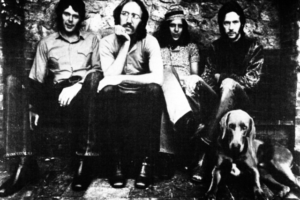
Feature Photo: Imperial Records, Public domain, via Wikimedia Commons Background Shutterstock
Our Top 10 Billy J. Kramer Songs list presents the best Billy J. Kramer Songs like “Little Children,” “Bad to Me” and many more. Before the world knew him as Billy J. Kramer, William Howard Ashton was born on August 19, 1943, and raised as the youngest sibling from a family of seven in Bootle, England. After graduating from school, he became an engineering apprentice with British Railways. In the meantime, he led a band where he started off as a guitarist before switching to vocals. The stage name of Billy J. Kramer came from the combination of picking a name out of the phone book and a suggestion made by John Lennon. While first using the Kramer monicker, he was discovered and recruited by Brian Epstein. This is the same Epstein that managed the career of The Beatles before his death in 1967.
With the Dakotas
While Kramer was under the guidance of Epstein, the backing group he had at the time was not at the same professional level he was. This resulted in Epstein recruiting The Dakotas, a band that hailed from Manchester. However, before the Dakotas officially joined Kramer, Peter MacLaine and his band insisted on having a recording contract of their own. As soon as this was established, Billy J. Kramer with the Dakotas became a two-entity act. As a group, they covered much of The Beatles’ material after that band made its big breakthrough. In an era where Merseybeat became a big part of the British music scene, Billy J. Kramer with the Dakotas reached the peak of their musical career while the infamous British Invasion swept across the nations of Canada and the United States of America during the mid-1960s.
In addition to covering hits by The Beatles, much of Kramer’s musical material was also written specifically for him by the songwriting team of John Lennon and Paul McCartney. It was this duo that was credited for launching Kramer’s career as an elite-class recording artist achieving stardom. Many of the songs he performed earned him guest appearances on various television programs, including The Ed Sullivan Show. Despite Kramer’s success, because the earliest hits of his musical career was written by John Lennon and Paul McCartney, he knew he’d remain in their shadow until he took a new creative direction. This resulted in the second number one hit in his career, “Little Children.”
Without the Dakotas
Billy J. Kramer with the Dakotas continued working together as a group until the 1966 release of “We’re Doing Fine” joined the ranks of previous singles that failed to make an impression on any official music charts. From that point on, Kramer embarked on a solo career, mostly working in cabaret and television. In 1983 and 1984, Kramer recorded and released a few singles that failed to chart. Later, in 2005, he performed “Cow Planet” for the Sandra Boynton children’s album, Dog Train. It wouldn’t be until 2012 that Kramer would return to the recording studio that saw the 2013 release of the CD album, I Won the Fight. It would be in that same year Vivek Tiwary’s 2013 graphic novel, The Fifth Beatle would become a best-selling publication. It was Kramer who provided the intro of this novel.
In 2015, he joined a series of other British-based artists as part of the fiftieth-anniversary tour that had performances take place in the UK and the US. Afterward, he published an autobiography, Do You Want to Know a Secret, in 2016.
Billy J. Kramer Legacy
There were six studio albums recorded and released by Billy J. Kramer, as well as five extended plays. There were also thirteen compilations and a total of thirty-two singles. It was Billy J. Kramer with the Dakotas from 1963 until they parted ways in 1966. Starting in 1967, Kramer embarked on a solo career that witnessed a series of singles released until 1986.
Top 10 Billy J. Kramer Songs
# 10 – 1941
In 1968, “1941” became a number fifty-seven hit on the Official UK Singles Chart’s Breakers List. It served as the final occasion Billy J. Kramer would experience a hit on any official music chart. This Harry Nilsson original was performed as a carnival-like somber ballad. Considering the song was about a man joining the circus after an encounter with a clown, the performance suited the theme. What made “1941” a favorite was the song’s theme contrasted sharply as a fun tune than the title suggested. Instead of “1941” revolving around World War II, as the title may suggest, it revolved around an environment that was a bit less catastrophic.
# 9 – I Won the Fight
Recorded in 2012, then released in 2013, “I Won the Fight” featured a mature Billy J. Kramer singing as a seasoned vocalist compared to the Merseybeat days he experienced in the 1960s. This was the title track of Kramer’s final studio album recording. Intentional or not, I Won the Fight, as a whole, seemed to serve as a tribute to the late Brian Epstein. The Nashville-like appeal behind “I Won the Fight” was hearing a vocalist share his experience as a Merseybeat balladeer that owed much of his success to Epstein, as well as the songwriting team of John Lennon and Paul McCartney. If there was ever a song that was genuinely Billy J. Kramer from start to finish, “I Won the Fight” is it.
#8 – I Call Your Name
From the John Lennon and Paul McCartney songwriting team, “I Call Your Name” was first released in 1963 by Billy J. Kramer with the Dakotas. For John Lennon, he was disappointed with the Dakotas failing to perform the song with a level of respect he felt it deserved. In 1964, he and his fellow Beatles recorded it for the Long Tall Sally EP. The song was then placed on the US Capitol album The Beatles’ Second Album. This Merseybeat-style number was still appealing enough to make it a Kramer favorite, perhaps as that fifth Beatle, due to the similarity in the artist’s vocal talent with the famous four.
#7 – Town of Tuxley Toymaker, Part One
“Town of Tuxley Toymaker, Part One” was a song written by the Gibbs brothers in 1966 that was first recorded by Jon Blanchfield. In 1967, Billy J. Kramer did the same. It was his first recording as a solo artist since parting ways with the Dakotas. This song earned its inspiration from Fiddler on the Roof‘s “Matchmaker” and was first released as a single while the Bee Gees were in England. It was later recorded with Billy J. Kramer with Barry, Maurice, and Robin Gibb each participating in his version of the song. On Australia’s Kent Music Report, it became a modest number ninety-one hit.
#6 – From a Window
In 1964, “From a Window” became the sixth and final song written and composed by John Lennon and Paul McCartney that would be recorded by Billy J. Kramer with the Dakotas. In this song, Paul McCartney’s musical contribution can be heard at the very end as a harmonious vocal. As a single, it was released in 1964 and later became a number ten hit on the UK Singles Chart. On the US Billboard Hot 100, it peaked as high as number twenty-three. In Sweden and Australia, Kramer’s version also made a chart impression, climbing as high as number eighteen and number fifteen, respectively.
#5 – I’ll Keep You Satisfied
“I’ll Keep You Satisfied” was a number-four hit on the UK Singles Chart after Billy J. Kramer with the Dakotas had it released in 1963. On the official New Zealand Singles Chart, it peaked as high as number three. When it was released a second time, it was in 1964 and for the US audience. It became a number thirty hit on the US Billboard Hot 100. The guitar solo featured in “I’ll Keep You Satisfied” served as a reflection of George Harrison’s earlier performance as a member of The Beatles. This made the song even catchier as an optimistic number to win over a love interest on an implicit level.
#4 – Trains and Boats and Planes
When “Trains and Boats and Plains” was released as a single in 1965, it became a number twelve hit on the UK Singles Chart. Written by Burt Bacharach and Hal David, it was one of two hit singles for Billy J. Kramer with the Dakotas that didn’t involve John Lennon and Paul McCartney. It was originally meant for Gene Pitney to record it but he refused. After a few more recording artists turned the song down, Brian Epstein brought the song to Kramer’s attention. For Kramer, it also became a number forty-seven hit on the US Billboard Hot 100, as well as a number ten hit on the US Billboard Adult Contemporary Songs chart. It also peaked as high as number thirteen in Australia.
#3 – Do You Want to Know a Secret?
In 1963, “Do You Want to Know a Secret?” became a number two hit for Billy J. Kramer on the UK Singles Chart after it was first released as his debut single. The inspiration behind the song came from the 1937 Wald Disney animated classic, Snow White and the Seven Dwarves. Before becoming a songwriter, John Lennon grew up listening to his mother singing “I’m Wishing.” The title of “Do You Want to Know a Secret?” came from Snow White’s “Want to know a secret?” line that was sung shortly after the song’s opening lyrics. Kramer’s version was a cover to what started out as a Beatles hit.
It was his version that became a hit in the UK while The Beatles version won over the American audience by peaking as high as number two on the US Billboard Hot 100. Also for Kramer, “Do You Want to Know a Secret?” became a number one hit on New Zealand’s official music chart, as well as a top ten hit among the nations of Ireland and Sweden.
#2 – Bad to Me
On the UK Singles Chart, “Bad to Me” became a number two hit for Kramer. Released in 1963, along with “I Call Your Name,” this became a certified gold record with the British Phonographic Industry. On the US Billboard Hot 100, it became a number nine hit, as well as a number six hit on the US Billboard Adult Contemporary Songs chart. It was also a number one hit in New Zealand and peaked as high as number twelve in Canada. Written by the John Lennon and Paul McCartney songwriting team, “Bad to Me” was specifically meant for Billy J. Kramer with the Dakotas.
After it was released as a single for the first time in 1963, it was released two more times in 1964. It was after the third time it became a hit in the US. In this song, the vocalist made a plea to his love interest to not leave him. This easy-listening classic became a favorite hit among most of the fans of Billy J. Kramer that still regards “Bad to Me” as one of his best performances.
#1 – Little Children
What makes “Little Children” the standout Billy J. Kramer favorite was the fact this was the first hit in the man’s career that did not come from the songwriting team of John Lennon and Paul McCartney. Instead of accepting another one of their songs, Kramer dared to try something different. When “Little Children” was released as a single in 1964, it became a number one hit on the UK Singles Chart. It also served as his biggest hit overall as it even peaked as high as number seven on the US Billboard Hot 100.
The content of the song revolved around convincing his love interest’s younger siblings to keep the true nature of his relationship in the dark from her parents. “Little Children” was that one song that broke Kramer away from the John Lennon and Paul McCartney mold, making this a song of his own that was written by somebody else instead of them. It was written by J. Leslie McFarland and Mort Shuman.
Top 10 Billy J. Kramer Songs article published on Classic RockHistory.com© 2022
Classicrockhistory.com claims ownership of all its original content and Intellectual property under United States Copyright laws and those of all other foreign countries. No one person, business, or organization is allowed to re-publish any of our original content anywhere on the web or in print without our permission. All photos used are either public domain creative commons photos or licensed officially from Shutterstock under license with ClassicRockHistory.com. All photo credits have been placed at end of the article.



































